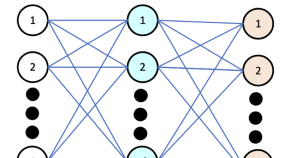Quantum particle Swarm optimized extreme learning machine for intrusion detection
Authors (first, second and last of 4)

Collection
Quantum Computing is considered as the next frontier in computing, and it is attracting a lot of attention from the current scientific community. These technologies introduce new mechanisms, based on quantum mechanics, to solve a wide variety of problems more efficiently: from those traditionally solved by means of machine learning and optimization, to simulation. By leveraging quantum phenomena, such as superposition and entanglement, the quantum information processing and the pure quantum or hybrid algorithms (both classical and quantum procedures interplaying) are expected to achieve a speed and/or precision advantage in modelling systems and in solving complex optimization problems. As a result of the growing interest in this field, quantum computing has already been successfully applied to a plenty of use cases, being industrial problems the main representative.
Last but not least, quantum technologies are shaking up the design, control and monitoring by new quantum sensors vastly improving the accuracy of the measurement. By collecting atom level data, the advanced versions of day-to-day technologies will incorporate, for example, more reliable geolocation and less vulnerable guidance systems which will be cornerstone for many industrial applications.
This special issue, to be published in The Journal of Supercomputing, aims at fostering discussions around the latest findings and research achievements, as well as the exchange of novel ideas in the application of quantum technologies to industry. We specially encourage researchers to submit their novel contributions on real-world oriented applications.
Please note that the authors of selected papers presented at ITSC 2023 are invited to submit an extended version of their contributions by taking into consideration both the reviewers’ comments on their conference paper, and the feedback received during presentation at the conference. It is worth clarifying that the extended version is expected to contain a substantial scientific contribution, e.g., in the form of new algorithms, experiments or qualitative/quantitative comparisons, and that neither verbatim transfer of large parts of the conference paper nor reproduction of already published figures will be tolerated. The extended versions of ITSC 2023 papers will undergo the standard, rigorous journal review process and be accepted only if well-suited to the topic of this special issue and meeting the scientific level of the journal. Final decisions on all papers are made by the Editor in Chief.
Eneko Osaba (PhD) (m) works at TECNALIA as researcher in the ICT/OPTIMA area. He obtained his PhD degree on Artificial Intelligence (Cum Laude) in 2015 in the University of Deusto. He has participated in the proposal, development and justification of more than 40 research projects. He has contributed in the development of more than 170 papers, including more than 30 Q1. He has performed several stays in universities of United Kingdom, Italy and Malta. He served as a member of the program and/or organizing committee in more than 60 international conferences.
Esther Villar Rodríguez (PhD) (f) holds a PhD (Cum Laude) in Information and Communication Technologies (2015) from the University of Alcalá (Spain), a BSc in Computer Science (2010) by the University of Deusto, and a M.Sc. (2012) in Computer Languages and Systems by UNED (National University of Distance Education, Spain). She was a senior researcher in Artificial Intelligence at TECNALIA (Spain), specialized in Shallow Learning and Deep Machine Learning models, distributed privacy-aware learning strategies (including Federated Learning), Reinforcement Learning and outlier detection, among others.
Izaskun Oregi (PhD) (f) received her degree in Physics from the University of the Basque Country, in 2011. In 2012 she got her M.Sc. degree in Physics of Complex Networks from the Polytechnical University of Madrid and in 2017 the M.Sc. degree in Mathematical Engineering from the Universidad Complutense of Madrid. She received her PhD in Artificial Intelligence from the University of the Basque Country, in 2020. To carry out her PhD, Izaskun received a doctoral grant from TECNALIA Research & Innovation, where she works as a researcher. She is also a part-time lecturer at EUNEIZ University.
Yue Ban (PhD) (f) is dedicated to the forefront fields of quantum computing, quantum control, quantum sensing. She obtained her PhD in Physics (Cum Laude) at the University of the Basque Country in 2013 with the financial support from Basque Government Fellowship. From Oct. 2013 to Apr. 2017, she was a Lecturer and an Associate Professor at Shanghai University. From May 2017 to May 2019, with Juan de la Cierva Fellowship, she was working in the Institute of Material Science of Madrid, ICMM-CSIC, developing solid-state-based quantum information processing.
Sebastián V. Romero (m) is pursuing a PhD in Physics at TECNALIA Research & Innovation and the University of the Basque Country since 2023. He holds a MSc in Physics “specialty in Nuclear and Particle Physics” (University of Santiago de Compostela, 2021) and a BSc in Physics (University of Santiago de Compostela, 2020). Being experienced in projects related with Particle Astrophysics and Quantum Computing, at the present time he is working at TECNALIA Research & Innovation studying quantum simulations and quantum optimization.
Cristina Mier González (f) is a researcher in quantum technologies at Tecnalia Research & Innovation. She obtained her Ph.D. (Cum Laude) in "Physics of nanostructures and advanced materials" in May 2023 from the University of the Basque Country (UPV/EHU). Cristina has focused her research on superconducting systems for the development of quantum technologies. Cristina holds a double B.Sc in physics and mathematics from Universidad de Oviedo and an M.Sc in Nanophysics from Université Grenoble Alpes.
